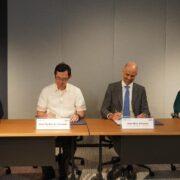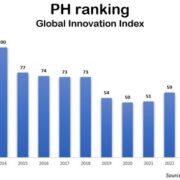
In an effort to grow climate finance in the Philippines, the International Finance Corporation (IFC), a member of the World Bank, has agreed to invest $250 million in a green bond to be issued by Bank of the Philippine Islands (BPI), the second largest private bank in the country. This is the biggest deal IFC has done with a financial institution in the Philippines.
Proceeds will be used to finance eligible green assets in the Philippines, including renewable energy, energy efficiency, green buildings, electric vehicles, and climate-smart agriculture projects, among others. While most of the proceeds will be used for local projects, part could also be used to invest in bonds with underlying green assets overseas. IFC has also agreed to help BPI build its capacity to assess the eligibility and impact of its climate projects.
IFC is the sole subscriber of the bond, which will be aligned with the International Capital Market Association’s Green Bond Principles.
As much as three quarters of the population of the Philippines is vulnerable to the impacts of natural hazards. The World Bank’s Country Climate Development Report estimates that the economic damage caused by climate change in the country could reach up to 7.6 percent of GDP by 2030.
“As a bank known for its commitment to sustainable finance and climate change mitigation, we are delighted that IFC has entrusted us with this significant investment,” said TG Limcaoco, President and CEO of BPI. “This is our third green bond issuance, and we will draw on our successful track record to fund projects that will make a lasting difference in the communities in which we operate.”
BPI first issued a green bond in 2018, which was more than four-times oversubscribed.
“IFC is pleased to continue its impactful partnership with BPI, a longtime client and partner in promoting climate finance in the Philippines,” said Jean-Marc Arbogast, IFC Country Manager for the Philippines. “Thematic bonds are a key pillar of our longstanding commitment to not only tackle climate change, but also to help deepen sustainable capital markets in the country.”
According to the latest data from the Philippines’ Securities and Exchange Commission, there have been 28 sustainability bond issuances collectively valued at more than US$10 billion since the first green bond was issued in 2016.
This green bond issuance is aligned with IFC’s 30 by 30 Zero Program, which aims to help financial institutions mobilize private financing for more climate-related projects in the Philippines. The end goal is to help them grow their climate-related lending to 30 percent of their total portfolios with near zero coal exposure by 2030.
As part of the program, IFC will also work with regulators and conduct training and workshops with potential issuers to support more thematic bond issuances in the country.
About IFC
IFC—a member of the World Bank—is the largest global development institution focused on the private sector in emerging markets. We work in more than 100 countries, using our capital, expertise, and influence to create markets and opportunities in developing countries. In fiscal year 2022, IFC committed a record $32.8 billion to private companies and financial institutions in developing countries, leveraging the power of the private sector to end extreme poverty and boost shared prosperity as economies grapple with the impacts of global compounding crises. For more information, visit www.ifc.org.
Stay Connected
www.ifc.org/eastasia
www.twitter.com/IFC_EAP
www.youtube.com/IFCvideocasts
www.ifc.org/SocialMediaIndex
www.instagram.com\ifc_org
www.facebook.com/IFCeap
www.facebook.com/IFCwbg
About BPI
Established in 1851, Bank of the Philippine Islands is the first bank in the Philippines and in the Southeast Asian region. BPI is a universal bank and, with its subsidiaries and affiliates, offers a diverse range of financial services serving retail and corporate clients.
BPI’s services include deposit taking and cash management, payments, lending and leasing, wealth management, bancassurance, investment banking, securities brokerage, foreign exchange and treasury. BPI is acknowledged as a leading provider of financial services and an industry pillar in the Philippines, with investment grade ratings: BBB+ (S&P), Baa2 (Moody’s), BBB (Capital Intelligence), and BBB- (Fitch).
BPI is also a distinguished leader in the region in incorporating sustainability in its operations. It is the first bank to have a time-bound policy in relation to coal financing – refusing to fund new greenfield coal projects since 2021, committing to halve exposure to coal projects by 2026 and zeroing this out by 2032. This commitment is a full year ahead of the global initiative for banks to eliminate coal exposure by 2033.
In 2023, BPI has received eight recognitions from prominent award-giving bodies in the region, including: Best Sustainable Bank in the Philippines and Biggest ESG Impact, Finance Asia Awards 2023; and Sustainable Finance Awards Winner for the Philippines, Global Finance.
Stay Connected
Contact Us:
Media: corporateaffairs@bpi.com.ph
Investor Relations: investorrelations@bpi.com.ph






